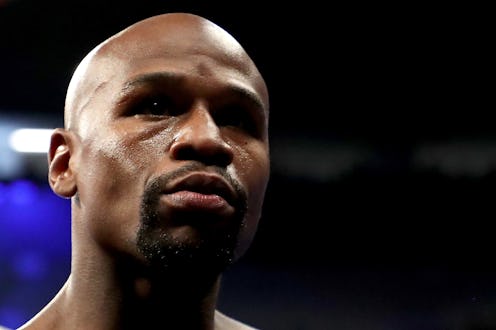News
This New Highest Paid Athletes Report Features Zero Women & At Least One Domestic Abuser

Forbes just released its list of the 100 athletes who made the most money in 2017, and these big-buck earners span a wide range of sports and countries. Yet they all shared one glaring similarity: All of them were men. Yep, the list of highest paid athletes included exactly zero women.
It might be difficult to believe that out of the 100 highest-paid athletes, not a single woman managed to crack the list. But according to Forbes, that's the cold, hard reality. The highest-paid athlete of 2017 was Floyd Mayweather, whose boxing career saw him earn $275 million dollars in salary and "winnings," plus another $10 million from endorsements. Mixed martial arts athlete Conor McGregor came in fourth on the list, raking in $85 million in the "salary/winnings" category and another $14 in endorsement deals.
The Mayweather-McGregor fight that took place in August 2017 was almost entirely responsible for both men's top spots on Forbes' list. According to Forbes, the total revenue haul for that one fight was more than $550 million. Mayweather negotiated a guaranteed $100 million payout, with $30 million promised to McGregor regardless of outcome. Both men walked away with much bigger paydays, due to fees made from promotion.
Last year, one woman did crack Forbes' top-100 list — Serena Williams. The most dominant female tennis player in history landed at No. 51 for earnings by athletes throughout the 2016 calendar year. She made a cool $27 million during that period, but has since fallen off the list due to a career break after giving birth to a baby daughter in September. In recent years, tennis players Maria Sharapova and Li Na have also qualified for Forbes' list, but neither woman made the cut in 2017.
This year's No. 51 athlete made about as much as Williams when she hit the same place — Forbes lists Celtics player Al Horford as earning $27.8 million dollars between 2017 and 2018.
Reactions on Twitter to the latest Forbes list indicate widespread disappointment in the striking discrepancy between what female athletes make compared to their male counterparts.
Tennis legend Billie Jean King tweeted in response, "Sports are a microcosm of society. Men, we need you to advocate as much for women as you do for other men." NHL correspondent Dave Hogg wrote, "Floyd Mayweather Jr. is the highest-paid athlete in the world and there are no women in the top 100. Both those facts say a lot about the world of sports."
In follow-up tweets, Hogg indicated he'd been blasted for "forcing" people watch women's sports. Hogg wrote, "I'm not making anyone watch. I'm not demanding female athletes get raises." He then had a political take, writing, "When it comes to Mayweather, it says a lot about how violence against women is seen in this country, but so does the fact a proud sexual predator is currently president." (Donald Trump has denied allegations of sexual misconduct.)
Ostensibly, Hogg was referring to allegations of domestic abuse. As USA Today reported, on seven different occasions Mayweather has faced allegations of domestic abuse, from five different women. In 2011, he pleaded guilty to a battery domestic violence charge from his ex-girlfriend and no contest to harassment charges, and he was sentenced to 90 days in prison.
Moya Crockett argues at Stylist that the issue here isn't necessarily "big, bad, sexist organizations not wanting to fairly compensate women athletes." She points out that 83 percent of sporting organizations give equal prize money payouts to male and female athletes. Rather, Crockett argues, the pay discrepancy is explained by "entrenched views about the status, popularity and financial value of women’s sports in comparison to men’s."
When broadcasters and promoters trust men to bring in paying viewership at much higher rates than women, they're willing to pay men much more. But Crockett argues that by "raising the profile... of women in sport," everyone might be surprised at just how popular female athletes would become. And mega paydays for women athletes would naturally follow.
Whatever the root cause, it's clear that women athletes make nowhere near as much money as their male peers.